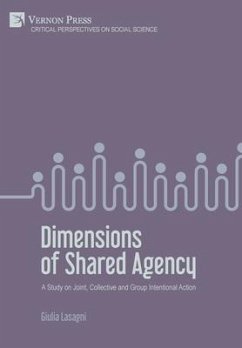"Dimensions of Shared Agency" investigates the way in which standard philosophical accounts have been dealing with the issue of collective actions. In particular, the book focuses on the 'Big Five' of analytical social ontology (namely, Michael Bratman, Margaret Gilbert, Philip Pettit, John R. Searle and Raimo Tuomela) and their accounts of shared/collective intentions and actions. Through systematic readings of different positions in the debate, the author proposes original ways of analyzing and classifying current theories of shared agency according to whether they advance a member-level or a group-level account of shared agency. While member-level accounts (MLA) are theories of shared agency based on individuals' attitudes and actions, group-level accounts (GLA) give attention to the group of individuals considered as a whole, i.e., as an agent itself. Criticism arises against the idea that the Big Five have proposed stable group-level accounts suitable for explaining the case of shared agency as a group-level phenomenon. The widespread tendency in the debate is to endorse a perspective called holistic individualism, which maintains that high-level explanations are objective even though social facts are ontologically reducible to facts about individuals. Lasagni argues that as long as holistic individualism is held, the GLA is reducible to the MLA because holistic individualism upholds ontological individualism based on a deep individualistic premise, fixing the special status of individual agents as natural persons. The premise makes the claim to treat groups as agents contradictory to the general framework of the theory. This book profiles an alternative interpretation according to which agency should be considered as a functional kind, which is equally instantiated by different systems, such as individual human beings and organized social groups. In this way, the author claims, the reduction of the social can be avoided. "Dimensions of Shared Agency" will be of interest to doctoral students, researchers, and scholars interested in social ontology and the philosophy of the social sciences. It can also be utilised as supplementary reading or an introduction to philosophy students and scholars who are first approaching the philosophy of collective intentionality and shared agency.
Hinweis: Dieser Artikel kann nur an eine deutsche Lieferadresse ausgeliefert werden.
Hinweis: Dieser Artikel kann nur an eine deutsche Lieferadresse ausgeliefert werden.








